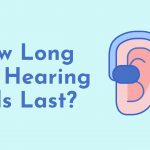In America today, about 48 million people are living with some type of hearing loss, but only one out of five are being treated with hearing aids. On average, people tend to wait about seven years from the time they realize they have hearing loss to the time they pursue hearing aids.
Hearing Loss Is Difficult to Notice on Our Own
Part of the problem is that hearing loss is sometimes difficult to notice in ourselves. It is usually another person who points out to us that we have hearing loss. This is because hearing loss progresses so slowly that we don’t notice it happening, and for the most part we don’t realize what we can’t hear. It is often the case that hearing loss has to progress to the point that a person has unavoidable difficulty in conversation before they get hearing aids.
Atrophy in the Auditory Cortex
Unfortunately, a lot is going on in the background while hearing loss progresses. As we take in less information through our ears, the auditory cortex in our brain finds itself with less information to process. Over time, the auditory cortex actually atrophies. The brain cells don’t die, but the structure of the auditory cortex tends to shrink and take up less space. This means that even once we do get hearing aids and are able to hear clearly, we will still have issues understanding speech. It really is like the old saying: “Use it or lose it.”
With time and effort, we can retrain our brains to understand speech again. This is why many audiology clinics offer training sessions for those who are new to hearing aids. But this problem does not have to arise if we get hearing aids when they are initially recommended.
Regular Hearing Tests
The Better Hearing Institute, a not-for-profit organization, recommends getting a hearing test once every decade until age 50, and once every three years thereafter. Those in high-risk professions or with other medical concerns should be tested even more frequently. Regular hearing tests allow hearing loss to be identified early. In some cases, it may be that we are more exposed to dangerous noise levels than we had assumed, and some simple lifestyle adjustments (like wearing earplugs or noise-canceling headphones) could help prevent further hearing loss.
Avoid the Negative Effects of Untreated Hearing Loss
For those with hearing loss that has progressed to a point that hearing aids are recommended, it’s important to start wearing them as soon as possible. In addition to the physical atrophy of our auditory cortex, untreated hearing loss tends to start off a cascade of negative lifestyle changes that can easily be avoided. When we can’t hear, we tend to enjoy social time less, and start to shrink away from it. We tend also to be less physically active. As time passes, we can end up feeling lonely, depressed and unhealthy.
By getting hearing aids at the time they are recommended, we can stay socially connected, physically active, fitter and happier. While it is not uncommon to experience a temporary sadness over hearing loss, getting hearing aids is the best way to move through it and continue to enjoy life.
Overwhelming Benefits of Wearing Hearing Aids
In fact, those who get hearing aids report overwhelming satisfaction with them, when asked after one year. About 95% of hearing aid wearers say it was a good choice to get hearing aids. Not only that, but studies show that hearing aid wearers are generally more optimistic, have greater confidence, and feel better about not only their personal futures but the future of society at large!
Getting hearing aids requires a period of adjustment, but the hearing aids of today are making that easier and easier. Hearing aids now perform most of their program changes automatically in the background, blending easily into our lives as we get used to them. While fitment is typically an ongoing process, your hearing aids can now connect directly to a smartphone app that will allow your audiologist to adjust their fitment remotely and instantaneously, meaning you don’t even need to return to the office when something doesn’t sound right to you.
Hearing Aids with FitHearing
Don’t make the mistake of putting off getting hearing aids. If you or a loved one is having hearing issues, make an appointment for a hearing test today and find out how we can help you keep living your best life!






